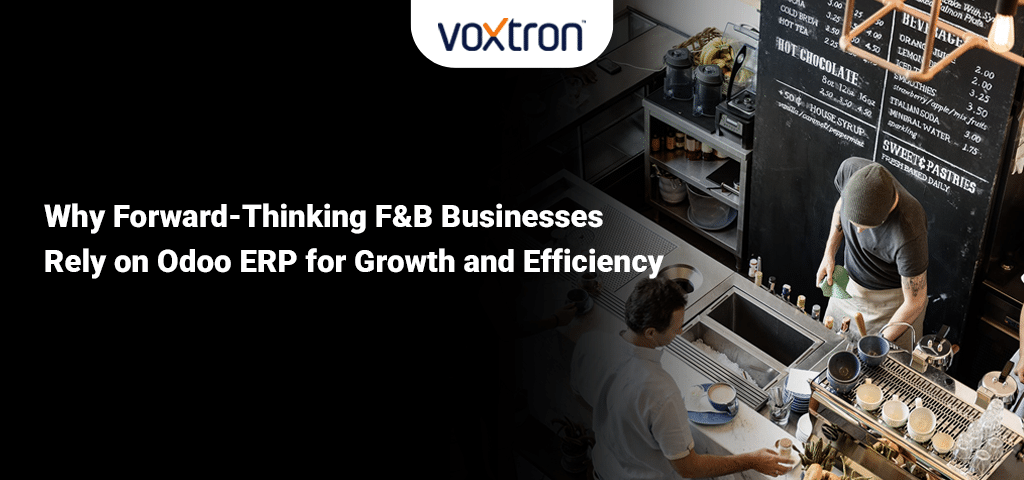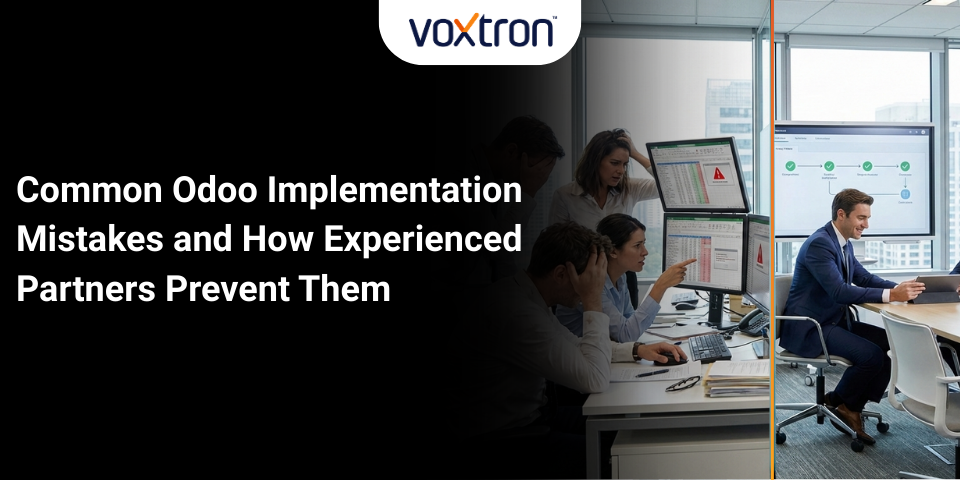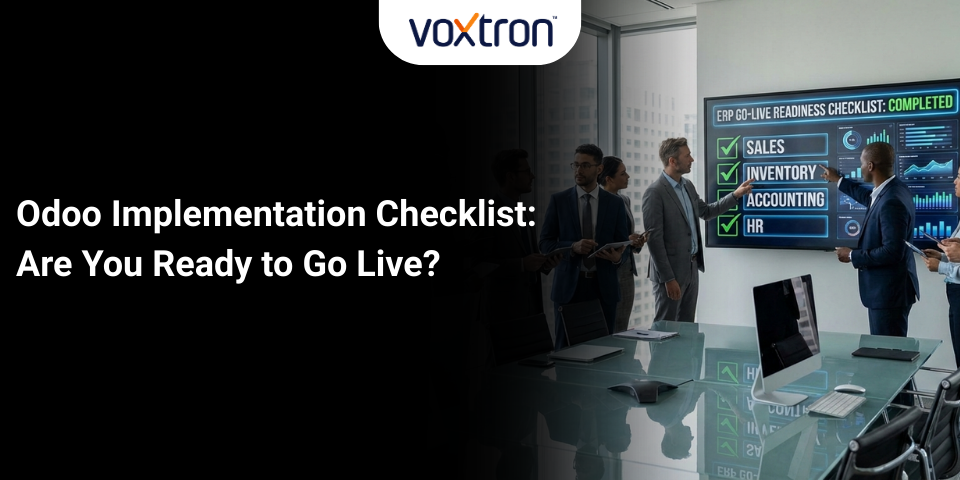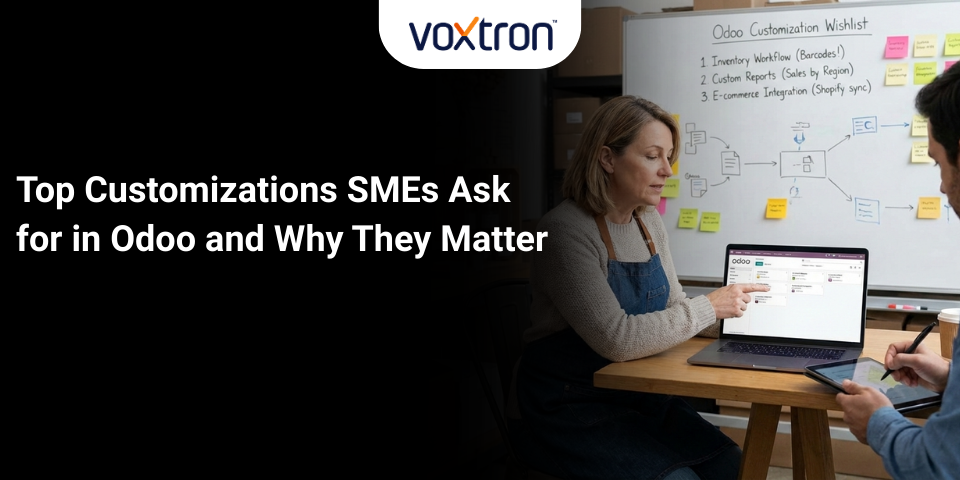
Evolving Contact Centers: Staying Current With Omni Quality Assurance
October 24, 2025
The Odoo Implementation Timeline: What to Expect?
November 19, 2025Why Forward-Thinking F&B Businesses Rely on Odoo ERP for Growth and Efficiency
The food and beverage (F&B) industry has undergone a dramatic transformation over the last decade. Businesses that started as small and locally managed have now evolved into expansive, multi-branch enterprises serving thousands of customers every day. Many businesses that began as bakeries have grown into café chains and restaurant brands, often expanding into multiple cities and even countries.
Such F&B players manage far more than just food production. They oversee centralized kitchens, handle multi-channel sales, partner with third-party delivery aggregators, and manage diverse product portfolios.
As these businesses expand, so does operational complexity. Yet, many established brands still rely on traditional, disjointed back-end systems such as Tally for accounting, standalone POS terminals for billing, and manual processes for menu and price updates across platforms.
This approach makes it difficult to maintain control and efficiency. In order to stay competitive, F&B enterprises need a single, unified solution that connects every function.
The Modern F&B Challenge: Disconnected Operations
As F&B businesses scale, one of the biggest challenges is managing data that doesn’t talk to each other.
For instance, a POS might record every sale efficiently. However, that information often fails to sync with the accounting system, stock ledger, or HR database. Thus, the management does not obtain a holistic view of related operations.
This lack of integration results in:
- Operational inefficiencies – Manual reconciliation of sales, inventory, and staffing data consumes time and increases errors.
- Financial blind spots – Revenue, expenses, and cash flow are difficult to track accurately in real time.
- Data gaps – Decision-makers rely on fragmented or outdated information, limiting their ability to respond quickly to market demands.
- Delivery management complexity – Each third-party delivery partner, such as Swiggy, Zomato, and Uber Eats, uses separate dashboards, making menu updates, price adjustments, and order tracking cumbersome and error-prone.
How Traditional Systems Operate and Where the Gaps Lie
Traditional F&B systems provide software for POS, accounting, inventory, and HR functions. However, as enterprises scale across multiple outlets and product lines, these systems begin to fall short. Lack of integration creates gaps that slow down operations and complicate decision-making.
For instance:
- POS systems capture sales accurately at the branch level but often fail to feed this data into centralized accounting or inventory systems automatically.
- Inventory management tools may track raw materials locally. Yet, they don’t sync seamlessly with procurement or warehouse data.
- Accounting software like Tally handles finance, yet it doesn’t integrate with live sales or delivery updates across multiple locations.
- HR modules operate independently, making it difficult to see resource utilization, leave balances, or payroll in the context of overall operations.
This fragmented approach slows operations, increases errors, and limits the ability to make informed, data-driven decisions. High-volume, multi-location F&B businesses also face added complexity with delivery partner management. Updating menus, prices, and order tracking across multiple platforms remains time-consuming. Additionally, it is prone to mistakes.
How an Integrated ERP Solution like Odoo Resolves Operational Gaps
An integrated ERP provides centralized visibility and control across all aspects of F&B operations. By unifying POS, inventory, accounting, HR, procurement, and delivery management, it offers the following advantages:
- Real-Time Data Synchronization: Sales, inventory, and financial data from multiple outlets are updated instantly. This reduces errors and eliminates the need for manual reconciliation. Managers can access a single platform for decision-making, whether tracking branch performance, stock levels, or financial health.
- Streamlined Delivery Management: Integration with multiple delivery partners allows menu updates, pricing, and promotions to be synchronized across platforms from a single interface. Thus, orders, status updates, and customer information are consolidated in real-time, simplifying operations and improving service accuracy.
- Unified HR and Accounting Functions: Employee attendance, payroll, and leave tracking are connected with overall operational data. This provides the management with a holistic view of workforce utilization and costs. Automatic consolidation of all financial operations, including multi-location revenue and expenses, reduces administrative workload.
- Scalable Multi-Branch Operations: With centralized procurement and inventory management, businesses can coordinate production from central production and storage units to individual outlets efficiently. Thus, stock transfers, supply planning, and demand forecasting become seamless, supporting consistent service and product quality across locations.
- Advanced Analytics and Reporting: An integrated ERP provides actionable insights through dashboards and reports, helping leadership identify trends, optimize processes, and plan for growth. Real-time analytics ensure decisions are based on accurate, up-to-date information.
Thus, an ERP connects previously siloed operations into a single, cohesive system. It resolves day-to-day inefficiencies and enables strategic growth.
Why Odoo ERP is the Right Choice for F&B Retail
Odoo ERP provides a unified platform to integrate key business functions in the F&B industry. Its modular design allows businesses to customize functionalities to match their specific operational requirements, enabling efficient management at the organizational level.
Odoo’s Key modules and functionalities include:
- Advanced POS for Multi-Branch Operations: Supports restaurants, cafés, and retail outlets with billing, table management, loyalty programs, and multiple payment options. Real-time sales data integrates seamlessly with inventory and accounting systems.
- Centralized Inventory and Production Management: Tracks raw materials, production schedules, and stock movement from central kitchens to individual outlets. Thereby, it optimizes supply planning and minimizes waste across locations.
- Delivery Partner Integration: Connects multiple delivery platforms through a single interface. Menu updates, pricing adjustments, and promotions are synchronized in real time, while orders, delivery status, OTPs, and customer details are centrally managed within Odoo POS.
- Unified Accounting and Financial Management: Consolidates revenue and expenses from all branches, automates invoicing, reconciles transactions, and generates real-time financial reports. Eliminates manual data entry and ensures accurate financial oversight.
- HR and Payroll Management: Tracks employee attendance, leave, and payroll across branches. Thus, it provides management with comprehensive insights into workforce utilization, staffing optimization, and compliance.
- Analytics and Reporting: Provides dashboards and actionable insights on sales trends, operational efficiency, inventory levels, and customer behavior. Enables informed, data-driven decision-making across the organization.
Conclusion
For F&B enterprises aiming to sustain growth, enhance customer experience, and streamline multi-location operations, adopting an integrated ERP like Odoo is a strategic imperative.
Voxtron offers an efficient and customized Odoo ERP solution tailored for the F&B industry, integrating advanced POS, delivery partner management, and key organizational modules. To learn more about how this solution can benefit your business, contact the Voxtron team today.




